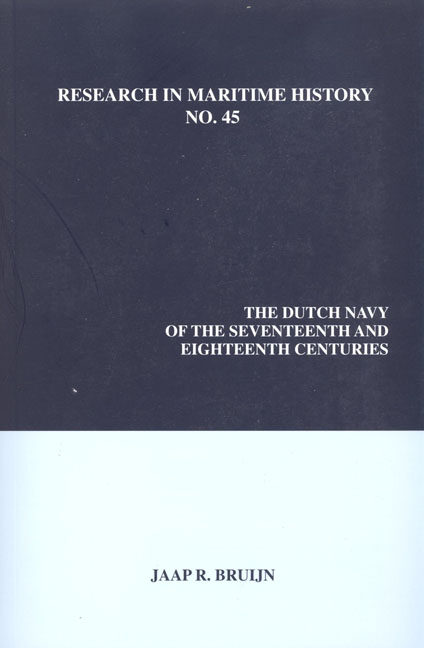Book contents
- Frontmatter
- Contents
- Illustrations
- Tables
- Series Editor's Foreword
- About the Author
- Introduction to the 2011 Edition
- Foreword
- Preface
- Introduction
- Map of the Dutch Republic
- Map of Dutch Naval Activity in European Waters
- Part One The “Old” Navy, Late 1500s-1652
- Part Two The “New” Navy, 1652-1713
- The “Old” Navy Out of Date
- John de Witt's New Navy
- An Era of Naval Campaigns against England and France and in the Baltic
- Changes in the Naval Administration
- De Ruyter and the Other Naval Officers
- Well-manned Ships
- Part Three A Second-Rate Navy, 1714-1795
- In Retrospect
- Bibliography
- Index
Well-manned Ships
from Part Two - The “New” Navy, 1652-1713
- Frontmatter
- Contents
- Illustrations
- Tables
- Series Editor's Foreword
- About the Author
- Introduction to the 2011 Edition
- Foreword
- Preface
- Introduction
- Map of the Dutch Republic
- Map of Dutch Naval Activity in European Waters
- Part One The “Old” Navy, Late 1500s-1652
- Part Two The “New” Navy, 1652-1713
- The “Old” Navy Out of Date
- John de Witt's New Navy
- An Era of Naval Campaigns against England and France and in the Baltic
- Changes in the Naval Administration
- De Ruyter and the Other Naval Officers
- Well-manned Ships
- Part Three A Second-Rate Navy, 1714-1795
- In Retrospect
- Bibliography
- Index
Summary
Problems such as those experienced by the Schrijver family seldom occurred with the common seaman of the Dutch navy, who had little opportunity to accumulate wealth. It was a world of great differences between the officers on the one hand, especially between captains and flag officers, and the rest of the crew on the other. Even the Friisian rear admiral Hendrick Bruynsveld, with an estimated capital of only 40,000 guilders in 1672, belonged to the twenty richest citizens of Harlingen. In social as well as financial matters, there was little dividing the city élite atri the navy, since most officers were members of that élite or were closely associated with it. The division between classes existed mainly on board ship and was quite obvious - even in the location of berths, with all officers lodged on the quarterdeck, and the rest of the crew mosdy in the forecasde.
The common seaman did not earn much money while on active duty in the navy, and always less than his counterpart in the merchant marine. In peacetime, his services were not in great demand. The monthly wage paid to an able seaman by the admiralty of Zeeland in 1669, for instance, was twelve guilders·, a first mate was paid thirty guilders. During a war, the wage level rose significandy, for example, from twelve to fifteen guilders for an able seaman. It was a matter of supply and demand, and if there was a shortage of seamen, naval authorities responded by increasing the wages. John de Witt was strongly against such a quick response, preferring a stable level of wages as “an iron law” that offered no hope of an increase. “Otherwise,” he said, “the state is at the discretion of the Jan Hagel [the riff-raff].” His thoughts, uttered in 1665, were generally accepted - a fact that prevented a repetition of the crisis in 1653 when seamen had successfully demanded eighteen guilders per month.
During most wars of the period 1652-1713, the able seaman's wage fluctuated between twelve and fifteen guilders. In the years 1672 and 1673, however, so many men were needed in the navy as well as in the army that unorthodox measures were required to assure that the fleet would be adequately manned. Coastal fishermen were offered freedom from the poll tax if they joined the navy, and the wages were much higher than before.
- Type
- Chapter
- Information
- The Dutch Navy of the Seventeenth and Eighteenth Centuries , pp. 114 - 126Publisher: Liverpool University PressPrint publication year: 2011

